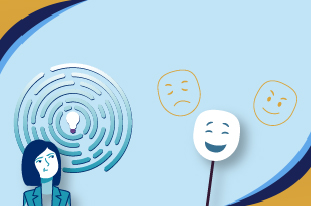You are suspicious that others might hurt you. You might worry about others harming you, or you might worry about people threatening your culture or society. This is called paranoia.
Many people have these kinds of thoughts in their lives. That’s normal.
But when these thoughts affect your personal life, give you anxiety, and cause a sleep disorder, this can be serious.
Paranoia can be a worry that lasts only a little while, or it can be a big worry that lasts a long time.
Some suggest that it can be a part of a bigger health problem called psychosis.
Because when you have psychosis, you might believe things that are not true.
These false beliefs are called delusions, false beliefs that do not have reality.
Sometimes, delusion is not about feeling threatened. These are beliefs that can’t change even if presented with evidence. You can take it like you might believe a famous personality is in love with you. This is delusion, and not paranoia.
Paranoia is a type of delusion where you believe people are trying to harm you.
What to Know About Paranoid Thoughts
Sometimes, our brains can play tricks on us. We might feel like someone is mad at us or that a coincidence is actually a secret message. These thoughts, which are often called paranoid thoughts, happen to many people. When we have knowledge about them, it can help us understand what’s going on in our minds.
Paranoia Is A Feeling Without Facts
Paranoia is when a person feels that others are against them or trying to hurt them, even when there is no proof.
A person with paranoid thoughts may think that their friends are talking about them behind their back, even if their friends have been kind and supportive. These thoughts can be scary and confusing. They are not based on real events.
Different Kinds of Paranoid Thoughts
Paranoid thoughts often fall into a few different groups. They can make us feel and think in different ways:
- Mistrust: This is when you feel suspicious of other people. You might think they have bad intentions, even when there’s no real reason to feel that way. It’s like feeling like your friends are talking about you behind your back, even though they’ve always been nice to you.
- Interpersonal Sensitivity: With this, you might think a person’s expressions or what they say are mean or negative. If someone gives you a strange look, you might believe they are angry with you, even if they aren’t.
- Ideas of Reference: This is when you believe that random events are about you. For example, if you hear a song on the radio, you might think the song is a special message meant only for you.
- Persecutory: This type of thought is more serious. It’s when you believe someone is trying to hurt or spy on you. You might think someone is watching your house or trying to cause you harm. Healthcare providers call this a delusion because it’s a very strong belief that isn’t true.
How Strong Are These Thoughts?
The power of these thoughts depends on a few things:
- How much do you believe them? Do you think they are true, or do you know they are probably not?
- How often do you think about them: Do they pop into your mind all the time, or just once in a while?
- How much do they bother you? Do these thoughts make you feel sad, scared, or worried?
- Do they stop you from doing things? Do they make it hard to go to school, see friends, or play?
When Is It Mild And When Is It Serious?
Most people have mild paranoid thoughts sometimes. These thoughts are nonclinical, which means they are not a big problem. They don’t last long, and you can usually think them through and realize they aren’t true.
Serious paranoid thoughts are very rare. The persecutory type, or a delusion, is considered very serious. If you or someone you know has thoughts like these that feel overwhelming or scary, it’s important to talk to a doctor or a trusted adult. They can help you understand what’s happening and find ways to feel better.

Justified Suspicion, a Thinking Based On Proof
Justified thinking is the opposite of paranoid thoughts. This is when a person has a feeling that is based on facts and proof. This kind of thinking helps people to remain safe. For example, if many houses in your neighborhood have been robbed, it makes sense that you might be among them in the future, and with this thinking, you lock your doors and windows. This is because there is really no proof of a threat. This type of thinking protects you from real dangers.
When a person thinks that someone is trying to harm them, it can be a feeling of paranoia or justified suspicion, based on past experiences and history. These feelings may seem the same, but they are very different. Just like a fire alarm, it is important to know when a fire is real and when it is not.
How To Know The Difference
It is important to know the difference between paranoia and justified suspicion. If you feel that someone is trying to harm you, ask yourself a question, like Do I have proof? If you do not, it may be paranoia. If you do have proof, it is justified suspicion that can help you stay safe. If you or someone you know is having paranoid thoughts, it is always a good idea to talk to a doctor or psychiatrist.
If you or someone you know is having paranoid thoughts, it is always a good idea to talk to a doctor. They can help you understand your feelings and find ways to feel better.
Sometimes Our Brains Get Tricky
They can be signs of different brain and body conditions.
Different Brain Conditions Can Cause These Feelings
Let’s look at some of the different reasons why a person might have these kinds of thoughts.
Delusional Disorder:
A person has a strong belief that isn’t true, and they also don’t have other things happening around them, like seeing or hearing things. For example, they might truly believe their neighbor is spying on them. This is called a delusional disorder.
Schizophrenia
This is a more serious condition where a person’s brain can feel very mixed up. They might believe things that aren’t true, and they might also hear voices or see things that aren’t there. A lot of people with this condition have paranoid feelings.
Personality Disorders
Some people have ways of thinking that make it hard to get along with others. A person with Paranoid Personality Disorder often doesn’t trust anyone and thinks people want to hurt them. Other personality conditions can also make a person feel paranoid, especially when they are under a lot of stress.
Mood Disorders
When someone is really sad (depression) or has very big mood swings (bipolar disorder), their feelings can get so strong that they start to have paranoid or delusional thoughts. This can be very serious and might make a person think about harming themselves.
Brain Conditions from Sickness
Sicknesses that affect the brain, like Alzheimer’s (which causes memory loss) or Parkinson’s disease, can also cause people to have these untrue thoughts.
Other Health Problems
Sometimes, these feelings can be caused by other health problems in the body, like a sickness in the brain, a stroke, epilepsy, or even a brain tumor.
If you or someone you know is having these kinds of thoughts, it’s always a good idea to talk to a professional, like a doctor, psychiatrist, or a trusted family member. It’s important to get help so you can feel better.

What Causes These Thoughts?
Doctors and scientists are still learning exactly why some people have these kinds of thoughts, but they believe it’s a mix of different things.
Your Genes and Brain
Sometimes, these thoughts can be passed down in families, just like the color of your eyes. The way your brain works and the special chemicals inside it also play a part.
Tough Times
When a person has experienced difficult or scary things, especially when in childhood, it can make their brain feel unsafe and lead to these feelings. Big worries or stress can also make paranoia stronger.
Other Reasons
Things like not getting enough sleep, remaining in loneliness a lot, or taking certain medicines can also cause these thoughts.
How To Get Help?
The good news is that there are many ways to get help and feel better. Our team at Orange Coast Psychiatry is here to help you find the right path.
Psychiatric Therapy
One of the best ways when you’re doubtful about having paranoid thoughts is to consult a professional or a therapist. They can understand your feelings better and give you a helpful guide to get rid of these thoughts. This is called therapy. You can understand how to understand your feelings, build trust, and make your mind happier again.
Medication
Sometimes, psychiatrists feel like medication can be helpful for immediate and early recovery, so they prescribe medication that controls the mind. This can help quiet down the loud, control irrelevant thoughts, so you can think more clearly.
We Can Help
At Orange Coast Psychiatry, we understand that these feelings can be scary. Our psychiatrists can talk to you and help you understand your thoughts. We want to help you feel safe and comfortable. If you have these kinds of worries, call us. We are here to help you.
If you have any questions or concerns related to other mental disorders and you want a trustworthy solution, you can contact us.


















